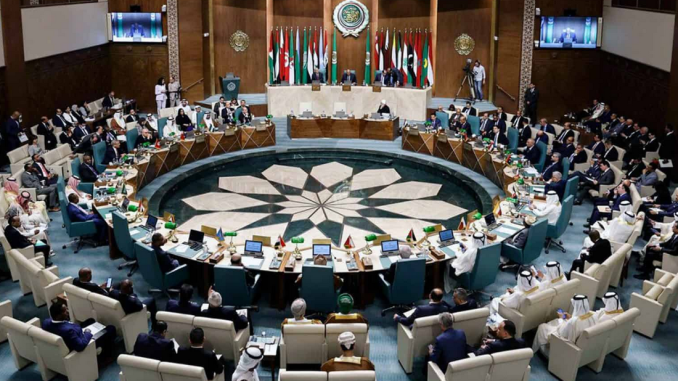Peloni: This will only make the Mullahs that much more desperate to restore their position in the region. Their regime must be eliminated.
By Janatan Sayeh | December 28, 2024
 The Arab League Hall in Cairo, Egypt
The Arab League Hall in Cairo, Egypt
The League of Arab States, based in Cairo and comprising 22 nations, issued a pointed rebuke of Iran’s ambitions in Syria on December 26, stating, “The Arab League rejects the recent Iranian statements aimed at inciting strife among the Syrian people.” This declaration underscores a broader shift: the Islamic Republic is steadily losing its foothold in a region where it has invested heavily—financially and militarily—for decades.
Syria: From ally to adversary
The Arab League’s statement aligns with the position of Syria’s new leadership under Hayat Tahrir al Sham (HTS) leader Abu Mohammad al Jolani, now known as Ahmad al Sharaa. Jolani previously accused Iran of fostering sectarianism and exacerbating corruption in Syria. On December 24, Syria’s new foreign minister, Asaad Hassan al Shibani, urged Tehran to respect Syria’s sovereignty and cease inciting discord, warning, “We hold them accountable for the repercussions of the latest remarks.”
Recent escalations, reportedly initiated by pro-Assad militias, have provided Damascus’s new authorities an opportunity to challenge Iranian influence. In the aftermath of the clashes, key figures associated with the Assad regime were detained for resisting disarmament. Among them was Fakhri Darwish, head of the Aleppo office of the Tehran-backed Al Quds Brigade militia.
Shifting dynamics in Iraq
This trend extends to Iraq, where Iran is also encountering resistance. On December 23, a leader of the Iran-backed al Nujaba militia, designated as a terrorist group by the US, disclosed to Lebanon’s Al Akhbar that factions within the Popular Mobilization Forces (PMF) had agreed to halt attacks on Israel and would remain silent regarding Syria. This arrangement, brokered with Iraqi Prime Minister Mohammed Shia Al Sudani—another figure with ties to Tehran—signals a recalibration of Iran’s regional strategy in light of Assad’s fall.
In another setback for Tehran, Sudani reshuffled his cabinet to reduce Iranian influence in Iraq’s security apparatus. For instance, Abdul Karim Abd Fadhil, an appointee with close ties to Iranian intelligence, was replaced as head of the Iraqi National Security Service (INSS) on December 19. His successor, Hamid al Shatri, met with Syria’s new leadership on December 26, suggesting that Sudani is prioritizing closer ties with Damascus while distancing his administration from Iranian control.
Potential fallout in Yemen
Despite these setbacks, Iran has not abandoned its regional ambitions. Supreme Leader Ali Khamenei and the Islamic Revolutionary Guard Corps (IRGC) have vowed to reclaim lost influence in Syria while also pursuing new methods of smuggling arms into Lebanon. However, Iran’s diminishing leverage has left its proxies vulnerable, with the Houthis in Yemen potentially next in line for their adversaries’ attention.
While the Tehran-backed Houthi group continues to threaten attacks against Israel and the US, it faces mounting pressure. On December 26, Israeli strikes targeted Houthi-controlled airports and ports used as logistical hubs. The following day, a US-manufactured Terminal High Altitude Area Defense system intercepted a Houthi missile following US strikes on December 21.
Iran’s attempts to retaliate have largely faltered. Israeli forces have neutralized Iranian missile stockpiles and air defense systems in response to Tehran’s missile attacks. The regime’s lack of response to Israeli strikes has even drawn criticism domestically, with a senior official admitting that Iran’s military is being “ridiculed” for its inaction.
With Syrian dictator Bashar al Assad deposed, Hezbollah weakened, and Iraqi militias deterred, the Houthis may soon find themselves the primary target of an intensified Israeli campaign. Iran’s regional strategy appears increasingly fragmented, with its ambitions meeting escalating resistance across the Arab world.



Leave a Reply
You must be logged in to post a comment.